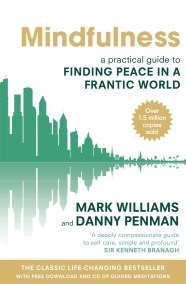How to use mindfulness meditation to improve your mental and physical health?

It has become widely accepted that mindfulness meditation is good for you. It can help break the cycle of anxiety, stress, unhappiness and exhaustion and promote a genuine joie de vivre; the kind of happiness that gets into your bones and allows you to meet the worst that life throws at you with new courage. Research centres around the world are continuing to discover the benefits of mindfulness meditation on mental and physical health. This extract, from the life-changing bestseller Mindfulness: Finding Peace in a Frantic World, looks more closely at just a few of the mental and physical benefits mindfulness promotes:
Meditation and physical health
Numerous clinical trials have shown that meditation can have a profoundly positive effect on physical health. One study, funded by the US National Institutes of Health and published in 2005, discovered that the form of meditation that has been practised in the West since the 1960s (Trancendental Meditation) leads to a massive reduction in mortality. Compared with controls, the meditation group showed a 23 per cent decrease in mortality over the nineteen-year period that the group was studied. There was a 30 per cent decrease in the rate of mortality due to cancer in the meditation group compared with combined controls. This effect is equivalent to discovering an entirely new class of drugs (but without the inevitable side effects).
Meditation and depression
Research has shown that an eight-week mindfulness-based cognitive therapy (MBCT course) – which lies at the heart of Mindfulness: Finding Peace in a Frantic World and is now available as an app – significantly reduces the chances of suffering depression. In fact, it reduces the likelihood of relapse by about 40–50 per cent in people who have suffered three or more previous episodes of depression. This is the first demonstration that a psychological treatment for depression, taught while people are still well, can actually prevent relapse. In the UK, the Government’s National Institute for Health and Clinical Excellence (NICE) has now recommended MBCT for those with a history of three or more episodes of depression in their Guidelines for Management of Depression (2004, 2009). Research by Maura Kenny in Adelaide and Stuart Eisendrath in San Franciso has also suggested that MBCT may be an effective strategy for those whose depression is not responding to other approaches, such as antidepressant medication or cognitive therapy.
Meditation versus antidepressants
We are often asked whether mindfuless can be used alongside antidepressants or instead of them. The answer to both questions is yes. Research from Professor Kees van Heeringen’s clinic in Ghent, Belgium, suggests that mindfulness can be used while people are still on medication. It was found that mindfulness reduced the chances of relapse from 68 per cent to 30 per cent even though the majority (a similar proportion in both MBCT and control groups) were taking antidepressants. With regard to the question of whether meditation can be an alternative to medication, Willem Kuyken and colleagues in Exeter and Zindel Segal and colleagues in Toronto showed that people who came off their antidepressants and did an eight-week course of MBCT instead, did as well or better than those who stayed on their medication.
Mindfulness. loving-kindness and positive mood
Professor Barbara Fredrickson and colleagues at the University of North Carolina at Chapel Hill have proved that meditation focusing on loving-kindness for the self and for others boosted positive emotions which then led to a sense of having a greater zest for life. After just nine weeks of training, meditators developed an increased sense of purpose and had fewer feelings of isolation and alienation, along with decreased symptoms of illness as diverse as headaches, chest pain, congestion and weakness.
Mindfulness and autonomy
Kirk Brown and Richard Ryan at the University of Rochester, New York, have discovered that more mindful people engage in more autonomous activities. That is, they do not do things because others want them to or pressure them into doing them. Nor do they engage in tasks just to help them look good to others, or even to help them feel better about themselves. Rather, those who are more mindful spend more time doing things that they truly value, or that they simply find fun or interesting to do.
The full eight-week mindfulness-based cognitive therapy (MBCT) programme, developed by Professor Mark Williams of Oxford University is available in Mindfulness: Finding Peace in a Frantic World by Professor Mark Williams and Danny Penman. You can also follow the eight-week MBCT programme on the Mindfulness: Frantic World app – available to download now.
THE LIFE-CHANGING BESTSELLER - OVER 1.5 MILLION COPIES SOLD
'A deeply compassionate guide to self-care - simple and profound' Sir Kenneth Branagh
'If you want to free yourself from anxiety and stress, and feel truly at ease with yourself, then read this book' Ruby Wax
Authoritative, beautifully written and much-loved by its readers, Mindfulness: A practical guide to finding peace in a frantic world has become a word-of-mouth bestseller and global phenomenon. It reveals a set of simple yet powerful practices that you can incorporate into daily life to break the cycle of anxiety, stress unhappiness and exhaustion. It promotes the kind of happiness that gets into your bones and allows you to meet the worst that life throws at you with new courage.
Mindfulness is based on mindfulness-based cognitive therapy (MBCT). Co-developed by Professor Mark Williams of Oxford University, MBCT is recommended by the UK's National Institute for Health and Care Excellence and is as effective as drugs for preventing depression. But, equally, it works for the rest of us who aren't depressed but who are struggling to keep up with the relentless demands of the modern world.
By investing just a few minutes each day, this classic guide to mindfulness will put you back in control of your life once again.









